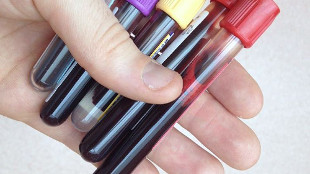Current molecular liquid biopsy assays to detect recurrence or monitor response to treatment require sophisticated technology, highly trained personnel, and a turnaround time of weeks. We describe the development and technical validation of an automated Liquid Biopsy for Breast Cancer Methylation (LBx-BCM) prototype, a DNA methylation detection cartridge assay that is simple to perform and quantitatively detects nine methylated markers within 4.5 hours. LBx-BCM demonstrated high interassay reproducibility when analyzing exogenous methylated DNA (75–300 DNA copies) spiked into plasma (coefficient of variation, CV = 7.1%–10.9%) and serum (CV = 19.1%–36.1%). It also demonstrated high interuser reproducibility (Spearman r = 0.887, P < 0.0001) when samples of metastatic breast cancer (MBC, N = 11) and normal control (N = 4) were evaluated independently by two users. Analyses of interplatform reproducibility indicated very high concordance between LBx-BCM and the reference assay, cMethDNA, among 66 paired plasma samples [MBC N = 40, controls N = 26; Spearman r = 0.891; 95% confidence interval (CI) = 0.825–0.933, P < 0.0001]. LBx-BCM achieved a ROC AUC = 0.909 (95% CI = 0.836–0.982), 83% sensitivity and 92% specificity; cMethDNA achieved a ROC AUC = 0.896 (95% CI = 0.817–0.974), 83% sensitivity and 92% specificity in test set samples. The automated LBx-BCM cartridge prototype is fast, with performance levels equivalent to the highly sensitive, manual cMethDNA method. Future prospective clinical studies will evaluate LBx-BCM detection sensitivity and its ability to monitor therapeutic response during treatment for advanced breast cancer.
Introduction
Breast cancer is now the most common type of cancer worldwide (1). In newly updated data, Globocan 2020 estimates that there were nearly 2.3 million new breast cancer cases detected worldwide, with 685,000 deaths occurring due to metastatic breast cancer (MBC; ref. 1). In underdeveloped regions, most breast cancer is first detected as metastatic disease because patients remain asymptomatic for long periods of time before showing clinical manifestations (2). To increase survival and reduce morbidity and breast cancer–related deaths, clinicians need sensitive techniques to detect cancer, monitor therapeutic response, and recognize disease progression.
In recent years, there has been a shift toward evaluating liquid biopsy methods to detect cancer and monitor breast cancer progression in circulating tumor DNA (ctDNA) of patients with advanced disease (3–6). While not yet standard of care, these approaches have enabled clinicians to use tests for ctDNA in plasma or serum as a less invasive indicator of the presence of disease. A simple, noninvasive, liquid biopsy test would potentially allow clinicians to monitor disease burden and response to therapy more closely, enabling changes in treatment regimens that provide the highest probability of success, thereby using imaging modalities more cost-effectively….







